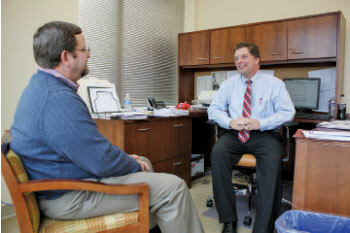
Robert and Foundation enable legacies of faith
 BY MELISSA LAUBER
BY MELISSA LAUBER
UMCONNECTION STAFF
“Prepare for Heaven in 2011.” It’s a slogan Frank Robert created and is proud of as he plans how to help people leave a legacy gift to their church.
He likes the slogan because it has a sense of lightheartedness, but underneath it points to a much deeper potential. By making the church a beneficiary in their will, people can make an impact and create transformative change in God’s name, Robert explained.
Just a few years ago, such ideas might never have crossed his mind. As a former executive sales representative at Sanofi-Aventis, a health care consultant at Pfizer, an assistant to the dean of admissions at the College of William and Mary and the current president of the town council of Sykesville, Robert understands that money is a vital tool and that actions have the power to shape communities.
However, after less than a year of working for the Mid-Atlantic United Methodist Foundation, he now also understands that money and faith can combine to create an unstoppable force and that dreams and plans are best when they are God-sized.
Robert is the associate director of the Foundation, which was created last July in a merger of the foundations of the Baltimore-Washington, Peninsula and Eastern Pennsylvania conferences.
The Foundation, he explained, “is a valuable resource for all United Methodist churches and agencies.” Churches invest money (a minimum of $10,000) with the Foundation, which works to grow these assets through socially responsible investing.
Executive director, Jack Brooks, whose office is in Valley Forge, Pa., is quick to point out that money invested with the Mid Atlantic United Methodist Foundation does just as well, if not better, than money invested in many secular firms.
Half of the 1 percent management fee is spent on developing stewardship resources for local churches. “Churches are essentially giving back to themselves,” said Robert.
Currently the Foundation manages investments totaling $56 million. Between 30 and 40 of its clients are churches from the Baltimore-Washington Conference.
In the past months, Roberts has visited many United Methodist churches, helping them learn how to invest their money to ensure the best investment performance possible.
This year he’ll also be stressing “legacy giving,” in which people can designate a certain amount or percentage of their estate to go to the church after they die.
When you die, 90 percent might be willed to your children, and 10 percent given to a ministry of the church that you love, Robert said. “The children probably won’t greatly miss that 10 percent, but it could be transformational to the church. It’s an easy way to give and can create huge results.”
Too often, people don’t like to talk about death. “But if you can’t go to your church and talk about end-of-life issues, where can you?” asked Robert, who joked, “We know who wins.”
Helping people use their legacy to create something of meaning is important, said Robert. “It’s a big deal. It makes an impact. For most churches, it will be transformational.”
But wills are just one way of investing in a church’s ministries. There are many vehicles for planned giving, like a charitable remainder trust that allows people to supplement their retirement income and create a trust that pays a fixed percentage of the trust’s assets, which are revalued annually.
There are also gifts of life insurance or property and a myriad of other ways to give, which Robert has been an expert at – helping people sift through so that they can discover what works best for them and their loved ones.
But one thing Robert, a member of St. Paul UMC in Sykesville, does stress: there is probably no right “magic stewardship bullet,” for individuals or churches. “Unfortunately, there’s no one, magic thing,” he said. People discover what works when they pray about it, research and learn and consult with people like him.
But leadership is an essential element of good financial stewardship, said Robert. When people begin to give, they become more generous. They get involved and giving creates more giving. It’s been shown that planned giving can increase the amount of money people put in the collection plate.
It may sound counter-intuitive, “but in many ways we work the opposite of American business,” Robert said. “My daughter’s youth group works all year raising funds, just to go on a one-week mission trip to give it away to help others. This is what we do in the Foundation. We raise money so that our churches can give it away for the Kingdom.”

Login/Register to leave comment